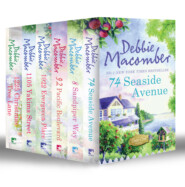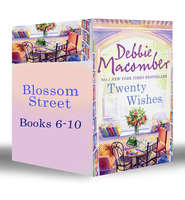По всем вопросам обращайтесь на: info@litportal.ru
(©) 2003-2025.
✖
Always Dakota
Автор
Год написания книги
2019
Настройки чтения
Размер шрифта
Высота строк
Поля
“It does my heart good,” Hassie had told her once. “This town is coming back to life and it’s starting right here in this shop.” And then the older woman said something that brought a rush of pride to Sarah every time she thought about it. “I couldn’t be prouder of you if you were my own daughter.”
“Afternoon, Hassie,” Sarah greeted her.
“I brought you a chocolate soda,” the older woman said, handing her a tall metal container filled to the brim with ice cream and soda. “I’m betting you didn’t eat lunch again today.”
Sarah hadn’t; she’d been too busy.
“We can’t have you getting weak and fainting on us, now can we?”
There was little likelihood of that happening, but Sarah wasn’t about to argue. Hassie made the best sodas she’d tasted anywhere. Until that moment, she hadn’t realized how famished she was.
“Thank you,” she said.
Hassie nodded, then left as abruptly as she’d come.
Sarah stood by the window and watched her. Since her own mother’s death, she’d considered Hassie both advisor and friend. In Sarah’s opinion, Hassie Knight had held this town together. If not for her, the community would have shriveled up and died the way so many other prairie towns had in the last twenty years.
Sarah’s gaze drifted toward her husband’s service station. It was difficult even now, three months after speaking their vows, to believe they were actually married. Unfortunately, the joy she felt was almost immediately squelched by regret at her daughter’s estrangement. For reasons no one fully understood, Calla disliked Dennis. When they’d announced their engagement, Calla had run away, choosing instead to live with her father in Minneapolis.
Sarah felt an oppressive sadness, a painful despair, whenever she thought about Calla. It was agonizing to see history repeat itself as she watched Calla make the same mistakes she had. Sarah felt so helpless. Nothing she’d said or done had brought Calla home. She shook off the memory; thinking about her daughter made it impossible to concentrate on work.
At five o’clock, her employees packed up and headed home. Sarah stayed behind, catching up on some long-overdue paperwork. An hour after she closed, Dennis joined her.
He walked into the back room, stood behind her, kissing her neck. “You ready to leave?”
He smelled of gasoline and grease, and spicy aftershave. Sarah closed her eyes and enjoyed the loving feel of his arms around her.
“I won’t be long. Did you go to the post office?”
His hesitation told her he had.
“There’s a letter from Calla,” he told her.
Sarah’s heart flew into her throat. She’d been so anxious to get a response about Thanksgiving.
“Open it later,” Dennis advised.
Sarah whirled around, unable to believe he’d say such a thing. “Why?” He knew she’d been waiting for days to hear from her daughter.
“What if she tells you she won’t come?” Dennis asked.
“Then she won’t be here.” Sarah’s flippant reply suggested it didn’t matter one way or the other. In reality, it meant everything. She’d only spoken to Calla a few times in the past five months. Despite her best efforts, every conversation had left her feeling guilty, upset and depressed. If only she could get Calla away from Willie’s influence, talk to her, reason all this out.
Thanksgiving would be perfect. Her father and her brother, Jeb, along with Maddy and the baby, would be joining them. Even Dennis’s parents were coming. A big family dinner, the kind they’d had when her mother was alive. Perhaps it was greedy of her, but Sarah wanted her daughter with them. Surrounded by family, Calla would surely feel the love everyone had for her, would surely realize how much they missed her. Realize how much Sarah needed her. Perhaps they’d even be able to break down the barriers and communicate as mother and daughter.
“Give me the letter,” she told him, and held out her hand.
“Sarah …”
“Dennis, please.”
His reluctance was obvious. She clutched the small manila envelope and was about to tear into it when she paused. “Perhaps you’re right,” she said, her voice shaking. All at once she was afraid of what she’d find inside.
“Open it,” Dennis said now. “You might as well. Get it over with.”
He was as ambivalent as she was. Sarah sighed deeply. Confronting her fear was more difficult than she’d expected. She opened the envelope, reached inside and pulled out half the airline ticket.
Sarah’s chest tightened and for a moment she could hardly breathe. Calla had torn the airline ticket in two and returned both halves.
“No letter?” Dennis asked, sounding as discouraged as she felt.
Sarah looked again and shook her head. “Why would she do something so cruel?” she asked.
“Come on, sweetheart,” Dennis said. “Let’s go home.”
“I don’t know why she hates me so much,” Sarah whispered. “If only she’d talk to me. If only …”
Four
Pastor Larry Dawson and his family had lived in fifteen different states in the past forty-three years, but he’d never thought of anywhere but Buffalo Valley as home. This was where he’d been born, where he’d gone to school, where he’d buried his mother and three years later, his father. From the day he left for the seminary, he’d planned to return to his childhood home—only, he hadn’t expected that to take over forty years. He was near retirement age now, and it made sense that he pastor a church in the very town where he’d spent his youth. His life was about to come full circle.
For a time, his return had looked doubtful. It seemed that despite all of Joshua McKenna’s and Hassie Knight’s efforts, Buffalo Valley was about to be snuffed out, like so many other small towns that dotted the Dakotas. Then, unexpectedly, the community had sprung back to life. Larry was thrilled and had managed to convince the church hierarchy to send him to Buffalo Valley.
The only church available belonged to the Catholics. It’d been closed for a number of years, ever since Father McGrath, hampered by age and failing health, had retired. Despite circumstances, the elderly priest had continued to stop by every few weeks to celebrate Mass. Recently, however, Father McGrath had entered a retirement home in Minnesota and the Bishop was eager to sell the property. The Methodist Church had bought it.
Soon after Larry had accepted the assignment, he’d found a nearby house to rent. The spare bedroom served as his office. The house was smaller than he would’ve liked, but it was fine for the time being. Fortunately his three daughters were grown and settled in careers and raising their own families. Unfortunately, they lived in three different states—Connecticut, Nebraska and Oregon.
Larry’s first official duty had been to officiate at the funeral of Bernard Clemens. He remembered the rancher, but it’d been years since they’d last spoken. The funeral, sad as it was, had been an opportunity to become acquainted with the people in town, those he’d once known and the younger people, whose families he often remembered. Larry had spent a good part of the day meeting and greeting his new neighbors.
In some ways, not much had changed in Buffalo Valley. When he’d left, there’d been a reserve toward strangers, a hesitancy. It remained in place to this day. The town … well, it looked better than he’d expected, but there was still much to be done. People were pleased with the most recent improvements and planning more. Then there was—
“Lunch is ready,” Joyce called from the kitchen, breaking into his musings.
He’d met Joyce while he was in the seminary. His wife had been raised in Boston, but over the years she’d come to love small-town life.
“What are your plans for the afternoon?” she asked as she sat across the table from him. She’d prepared one of his favorites, a chicken salad made with cold noodles and tossed with a soy vinaigrette, but today he had virtually no appetite.
“I thought I’d go over and visit Joshua.” A question about a couple he’d met at Bernard’s funeral had been bothering Larry and he could think of no one better to ask than his old friend. After barely touching his lunch, he wandered over to Joshua McKenna’s second-hand store. Joshua sold a little of everything. The sign in his window claimed there wasn’t anything he couldn’t fix, and Larry believed it.
“Good to see you,” Joshua called out when the bell above the door announced Larry’s arrival.
“I’m not disturbing you, am I?” Larry saw that Joshua was up to his elbows in grease, working on some kind of engine.
“Trust me, I welcome the interruption.” Joshua reached for a wadded-up rag, tucked in his back hip pocket. “This,” he said, gently patting the huge metal contraption, “is the engine to Gage Sinclair’s tractor. Dennis had it two weeks and couldn’t get it running. He threw up his hands and asked me to give it a try.”
Larry knew that low prices were killing many of the small farmers in the heartland. Farmers kept their equipment running as long as possible, and then eked out another twenty thousand miles.
“Did you hear I was over at Buffalo Bob’s?” Larry said as Joshua studied the engine. “Went there a couple of weeks ago, after I met them at Bernard’s wake.” Bob had talked him into trying his karaoke machine. Larry had no singing voice whatsoever, but bolstered by Merrily, he’d fallen victim. He was fairly confident they wouldn’t invite him to sing again.











